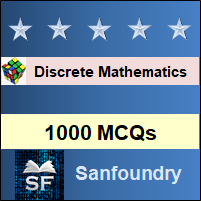
Discrete Mathematics Multiple Choice Questions Highlights
- 1000+ Multiple Choice Questions & Answers (MCQs) in Discrete Mathematics with a detailed explanation of every question.- These MCQs cover theoretical concepts, true-false(T/F) statements, fill-in-the-blanks and match the following style statements.
- These MCQs also cover numericals as well as diagram oriented MCQs.
- These MCQs are organized chapterwise and each Chapter is futher organized topicwise.
- Every MCQ set focuses on a specific topic of a given Chapter in Discrete Mathematics Subject.
Who should Practice Discrete Mathematics MCQs?
– Students who are preparing for college tests and exams such as mid-term tests and semester tests on Discrete Mathematics.- Students who are preparing for Online/Offline Tests/Contests in Discrete Mathematics.
– Students who wish to sharpen their knowledge of Discrete Mathematics Subject.
- Anyone preparing for Aptitude test in Discrete Mathematics.
- Anyone preparing for interviews (campus/off-campus interviews, walk-in interview and company interviews).
- Anyone preparing for entrance examinations and other competitive examinations.
- All - Experienced, Freshers and College / School Students.
Discrete Mathematics Chapters
Here's the list of chapters on the "Discrete Mathematics" subject covering 100+ topics. You can practice the MCQs chapter by chapter starting from the 1st chapter or you can jump to any chapter of your choice.- The Foundation: Logics and Proofs
- Basic Structures: Sets, Functions, Sequences, Sums and Matrices
- Algorithms
- Number Theory and Cryptography
- Induction and Recursion
- Counting
- Discrete Probability
- Relations
- Graphs
- Trees
- Boolean Algebra and Modeling Computations
- Groups
1. The Foundation: Logics and Proofs
The section contains multiple choice questions and answers on propositions, logic operations and circuits, implications, de morgans law, statements types, tautologies, logical equivalences, quantifiers, inference and proofs types.
2. Basic Structures: Sets, Functions, Sequences, Sums and Matrices
The section contains questions and answers on sets and its operations and types, venn diagram, subsets, functions and its growth, algebraic laws, range and domain of functions, arithmetic and geometric sequences, special and harmonic sequences, matrices types, properties and operations, transpose and inverse of matrices, sequences and summations.
3. Algorithms
The section contains MCQs on algorithms and its types, algorithms complexity, integers and division.
|
|
|
4. Number Theory and Cryptography
The section contains multiple choice questions and answers on prime numbers, quadratic residue, lcm, hcf, base conversion, exponent rules, number complement, number theory applications, modular exponentiation, ciphers, cryptography encryption and decryption.
5. Induction and Recursion
The section contains questions and answers on strong induction and ordering, mathematical induction principles and recursion.
|
|
|
6. Counting
The section contains MCQ on counting and pigeonhole principle, linear and circular permutations, combinations, divisors, derangement, recurrence relation, binomial expansion terms and coefficient.
7. Discrete Probability
The section contains multiple choice questions and answers on addition and multiplication theorem on probability, probability distribution, bayes theorem, generating functions, inclusion and exclusion principles, logarithmic and power series.
8. Relations
The section contains questions and answers on relations types and closure, partial orderings and equivalence classes.
|
|
|
9. Graphs
The section contains MCQs on diagraph, hasse diagrams, lattices, bipartite graphs, graph properties, connected graphs, planarity, graph coloring, different path in graph and graph matrices.
10. Trees
The section contains multiple choice questions and answers on tree properties, cycles, tree traversal, spanning trees, prefix, postfix and infix notations.
|
|
|
11. Boolean Algebra and Modeling Computations
The section contains questions and answers on boolean algebra and functions, karnaugh maps, gates interconversion, prime implicants and essentials, minimization of boolean functions and finite state automation.
|
|
|
12. Groups
The section contains MCQs on group theory and axioms, closure and associativity, subgroups, identity and inverse existence, burnside theorem, cyclic and permutation groups.
|
|
|
Wish you the best in your endeavor to learn and master Discrete Mathematics!
